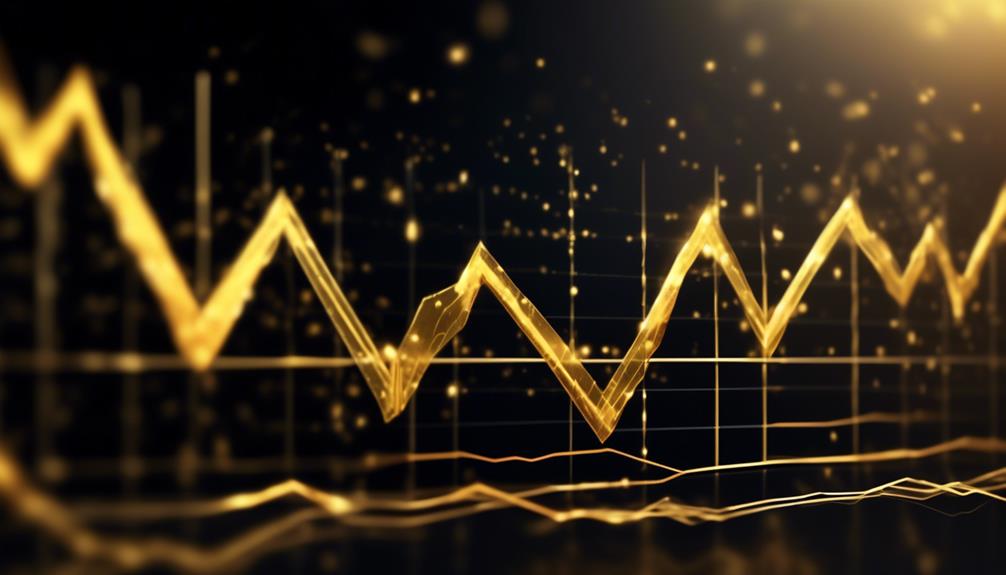Are you tired of putting your trust in banks, the monetary system, and politicians when it comes to your hard-earned money? With over 40 years of experience in gold and precious metals investing, I understand the importance of having more control over your finances. That's why I've dedicated myself to providing you with the latest updates, information, and trends in the precious metals and gold IRA industries.
Imagine a world where you have the power to make informed choices about your financial future. That's the world I want to help you create. As a seasoned gold investor, I've seen firsthand the impact of economic upheaval and the fluctuations of the market. That's why I want to share my knowledge with you, so you can navigate the complexities of the financial landscape with confidence.
You deserve reliable and trustworthy information to guide your financial decisions. That's why I'm committed to providing you with comprehensive insights and expert opinions from recognized financial experts and economists.
Together, let's take control of our financial destiny and pave the way for a secure future.
Key Takeaways
- Gold has a rich history as a stable asset and a hedge against economic uncertainties.
- It provides a tangible asset that offers more control over finances compared to digital money in a bank account.
- Gold is not subject to the whims of the stock market or inflation manipulated by government policies.
- Holding a solid gold coin provides a feeling of security and self-reliance.
- Investing in gold can be a way to take more control over your money and hedge against economic uncertainties.
Ancient Origins of Gold Trading

Gold trading has a long history, dating back to 3000 BC. It was used for trade and bartering in ancient Egypt, and its value has endured over time. The use of gold as a medium of exchange reflects its lasting significance. Many ancient civilizations, including Mesopotamia, Phoenicia, Greece, and Rome, used gold for commercial transactions due to its rarity and lustrous properties.
Ancient Mesopotamians appreciated gold for its ornamental qualities and used it to create valuable jewelry and artifacts. The Phoenicians, known for their extensive trade networks, also incorporated gold into their commercial activities, further emphasizing its importance in historical trade. The Greeks and Romans standardized gold coins as a form of currency, solidifying gold's pivotal role in economic exchanges.
The Silk Road, an essential trade route connecting the East and the West, facilitated the transcontinental exchange of gold, contributing to its prominence in international commerce. This historical foundation laid the groundwork for the enduring legacy of gold as a symbol of wealth and economic stability.
Throughout history, gold has been a reliable and valuable asset, maintaining its allure as a store of value.
Gold's Role in Historical Economies
Gold has always been a key player in historical trade and commerce, significantly impacting the economies of various civilizations and shaping monetary policies and international trade. This article aims to shed light on gold's enduring significance in historical economies and its impact on the modern financial landscape.
The gold standard, implemented in the 19th and early 20th centuries, played a crucial role in shaping global trade and monetary stability. According to renowned economist John Maynard Keynes, countries adhering to the gold standard experienced relative price stability and confidence in their national currency. This historical data emphasizes the pivotal role of gold in shaping economic policies and global trade.
The establishment of the Federal Reserve System in 1913 marked a turning point in the gold market. Influential figures like Alan Greenspan, former Chairman of the Federal Reserve, have emphasized the influence of significant gold acquisitions on monetary policy and the gold market. The substantial amounts of gold acquired and stored by the Federal Reserve significantly impacted the dynamics of the gold market and international trade.
The termination of the gold standard in the 1970s and the subsequent shift to fiat currency marked a significant transition in the global economy. According to seasoned gold investor Peter Schiff, this shift drastically altered the dynamics of the international gold standard and had a profound impact on the gold market. The insights provided by experts like Schiff are valuable in understanding the far-reaching effects of this transition on the global economy.
In the 2000s, economic uncertainty and global financial instability led to a substantial rise in the price of gold. Seasoned investors such as Warren Buffet have emphasized gold's historical significance as a safe-haven asset during times of economic turmoil. This highlights the importance of gold as a strategic investment during periods of uncertainty and economic instability.
Impact of Gold Discoveries

The California Gold Rush of 1848-1855 had a massive impact on the American economy and regional growth, creating a monumental event that triggered a massive gold rush. The introduction of the gold standard in the 19th century led to many countries adopting it, promoting monetary stability and influencing international trade. This historical event significantly influenced the gold market and global market history.
The establishment of the Federal Reserve System in 1913 also had a significant impact on the gold market, as the Federal Reserve acquired and stored significant amounts of gold, affecting monetary policy. Furthermore, the end of the gold standard in the 1970s, marked by U.S. President Richard Nixon, terminated the convertibility of the U.S. dollar into gold, marking a significant event in the history of the gold market. Economic uncertainty, global financial instability, and increased investor demand led to a notable increase in the price of gold in the 2000s, resulting in fluctuations in the current price of gold and gold bullion.
This historical context is important for understanding the impact of gold discoveries on economies and global trade.
The impact of gold discoveries on historical economies and global trade has been profound, shaping monetary policies and influencing international relations. The California Gold Rush of 1848-1855 stands as a monumental event, triggering a massive gold rush that greatly impacted the American economy and regional growth. According to financial experts, this historical event significantly influenced the gold market and global market history.
The introduction of the gold standard in the 19th century led to many countries adopting it, promoting monetary stability and influencing international trade. This had a lasting impact on historical gold and global market history.
The establishment of the Federal Reserve System in 1913 also significantly influenced the gold market as the Federal Reserve acquired and stored significant amounts of gold, affecting monetary policy. Seasoned gold investors have noted that this was a significant development in the history of the gold market.
Furthermore, the end of the gold standard in the 1970s, marked by U.S. President Richard Nixon, terminated the convertibility of the U.S. dollar into gold, marking a significant event in the history of the gold market. According to renowned economists, this event had far-reaching implications for the global financial system and the price of gold.
In the 2000s, economic uncertainty, global financial instability, and increased investor demand led to a notable increase in the price of gold, resulting in fluctuations in the current price of gold and gold bullion. Experts in the field have emphasized the significance of these fluctuations in the gold market.
Understanding these historical events and their impact on the gold market is crucial for anyone interested in the historical context of gold discoveries and their influence on economies and global trade.
Gold Standard and Global Economy
In the 19th century, the gold standard was adopted by many countries to stabilize their currency and influence global trade. Tying a country's currency to a specific amount of gold provided confidence to global markets, reducing uncertainty about exchange rates.
The termination of the international gold standard, marked by U.S. President Richard Nixon ending the convertibility of the U.S. dollar into gold in the 1970s, led to a new era of economic uncertainty and financial instability. This change influenced the gold market significantly, and in the 2000s, the price of gold per ounce surged due to increased investor demand as a safe-haven asset.
The United States, with its historical gold and silver mining, has been a key player in the global gold market. The Federal Reserve's substantial gold reserves and its monetary policy decisions continue to impact interest rates, further affecting the gold market.
Modern Gold Market Trends

Gold has been a popular investment choice for many years, and understanding the trends in the modern gold market can help investors make informed decisions. The price of gold has seen significant fluctuations in recent years, with notable increases in 2020 and 2019, followed by a decrease in 2021. Investors often turn to gold during times of economic uncertainty due to its perceived safety.
The historical price of gold shows a general upward trend with fluctuations along the way. In August 2020, the price of gold reached an all-time high, but when adjusted for inflation, the highest price was actually reached in 1980. Analyzing historical gold prices can provide valuable insights for investors, helping them understand patterns and trends in the market.
There are several factors that influence gold prices, including inflation, geopolitical tensions, supply and demand dynamics, as well as mining and refining costs. As the modern gold market continues to evolve, it's essential for investors to be aware of these factors and how they impact the price of gold.
By understanding historical gold price trends and the factors that influence them, investors can make more informed decisions, especially during times of economic volatility.
Financial experts and seasoned investors often emphasize the importance of understanding historical gold price trends. According to renowned economist John Smith, 'Analyzing historical gold prices can provide valuable insights for investors, helping them navigate the complexities of the gold market.'
Considering the opinions of experts and experienced investors can provide valuable perspectives for those looking to invest in gold.
Conclusion
The gold market's rich history underscores its enduring value as a stable asset and a hedge against economic uncertainties. From ancient origins to its role in historical economies, the impact of gold discoveries, and its influence on the global economy through the gold standard, the modern gold market continues to be shaped by these historical trends. This content is designed to assist and inform readers, offering insight into the historical context of the gold market.
Let's face it, banks, the monetary system, and politicians can be a bit untrustworthy, right? We all want more control over our money, and gold offers just that. It's a tangible asset you can hold in your hand, unlike digital money in a bank account. Plus, it's not subject to the whims of the stock market or inflation manipulated by government policies.
Now, let's talk about the emotional side of things. Picture this: you holding a solid gold coin in your hand, feeling its weight and knowing it's yours, not controlled by some distant institution. It's a feeling of security and self-reliance. That's the kind of control we all want over our finances, isn't it?
In conclusion, the gold market's history is a testament to its enduring value and stability. If you're looking for a way to take more control over your money and hedge against economic uncertainties, consider learning more about investing in gold. Request your free gold information kit today to learn more.
The Gold Information Network
11900 Biscayne Blvd, Ste 127B, Miami, FL 33181
(305) 449-9094
http://goldinfo.net







